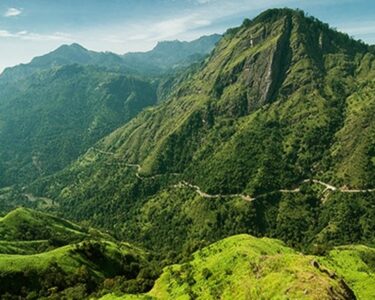Amidst the snow-capped peaks of Davos, where global elites gather to discuss the future of the world, President Ranil Wickremesinghe of Sri Lanka has planted a flag for his nation’s green ambitions. In a series of crucial engagements, including a meeting with former US Vice President Al Gore and a powerful speech at the Green Technology Forum, Wickremesinghe has underscored Sri Lanka’s immense renewable energy potential and its unwavering commitment to combating climate change.
The theme of this year’s World Economic Forum, “Rebuilding Trust,” resonates deeply with Sri Lanka’s journey. Battered by economic and political upheaval, the island nation seeks to rebuild trust not only on the global stage but also within its borders. And at the heart of this endeavor lies a vision for a sustainable future powered by clean energy.
Wickremesinghe’s message to potential investors is clear: Sri Lanka is not just open for business; it is fertile ground for renewable energy projects. He paints a picture of a sun-drenched island blessed with windswept coasts and cascading waterfalls, brimming with untapped potential for solar, wind, and hydropower. This, he assures, is not just an environmental imperative but an economic one as well. The rapid rollout of green energy projects, he argues, will not only bolster energy security but also create jobs, attract investment, and unlock the doors to a cleaner, more prosperous future.
He points to the establishment of an investment-friendly policy framework, the implementation of ambitious initiatives like the “Tropical Belt Initiative”, and the unwavering pursuit of a net-zero emissions target by 2050. These are not mere pledges; they are a roadmap, a testament to Sri Lanka’s determination to walk the talk on climate change.
However, Wickremesinghe does not shy away from addressing the elephant in the room: climate justice. He highlights the disproportionate impact of climate change on developing nations like Sri Lanka, who bear the brunt of a crisis they did little to create. This injustice, he emphasizes, demands a stronger contribution from advanced economies towards adaptation and mitigation efforts in the global south.
He paints a picture of Sri Lanka rising from the ashes, not just through economic revival but through a transformation into a green energy powerhouse. His call to action is not just for investors but for the entire global community to recognize the interconnectedness of our planet and the urgency of climate actio
From the snow-capped peaks of Davos, a message echoes: Sri Lanka is greening its future, one wind turbine, one solar panel, one hydropower project at a time. And in doing so, it hopes to pave the way not just for its own prosperity but for a more equitable and sustainable future for all
At home, the leader of the JVP pointed out that the president has made 12 foreign trips within the last 12 months and said that they would like to see the incurred expenses in the public domain.







